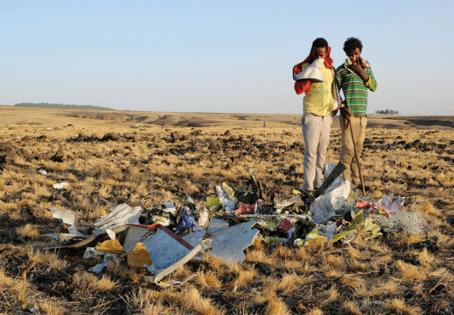Boeing let off in 737 Max crashes in deal judge says won't protect public
Published in Business News
The Department of Justice secured judicial approval to drop the sole criminal charge against Boeing filed after two deadly 737 Max crashes, moving forward with a nonprosecution agreement even as the judge warned the deal won’t ensure the safety of the flying public.
Prosecutors secured judicial approval Thursday to drop the final criminal charge, but the Texas judge who ratified the agreement warned it won’t ensure the safety of the flying public.
U.S. District Judge Reed O’Connor ruled Thursday that the Department of Justice and Boeing could move forward with a nonprosecution agreement, which would drop the criminal fraud charge while imposing new fines and compliance requirements on the company.
Federal prosecutors charged Boeing in 2021 with criminal fraud following accusations that the manufacturer misled safety regulators about a then-new software system on the 737 Max. An error with that system — known as the Maneuvering Characteristics Augmentation System, or MCAS — led two planes to nosedive, first in Indonesia in 2018 and then in Ethiopia in 2019, killing a total of 346 people.
Since then, Boeing, the Justice Department and the families of the crash victims have been locked in litigation.
The only Boeing employee charged with a crime after the deadly crashes, Mark Forkner, was acquitted by a jury in 2022. Thursday’s decision resolves a criminal charge filed against the company itself.
Boeing has admitted responsibility for the crashes while responding to a string of civil lawsuits filed on behalf of the crash victims’ families, and settled most of those cases out of court.
But, for the first time, one of those cases moved forward to trial, with jury selection and opening statements this week.
Boeing and the Justice Department had twice tried to reach agreements to drop the criminal charge but both deals fell apart.
In 2024, after a panel flew off a 737 Max midflight, the Justice Department determined Boeing did not meet conditions set out in a deferred prosecution agreement that would have dismissed the charge. Later that year, O’Connor struck down a plea agreement between the two parties.
This year, Boeing and the Justice Department again reached an agreement to drop the charge and secured approval from O’Connor to move forward.
But O’Conner’s decision Thursday is not the end of the legal saga. The families who lost loved ones in the fatal crashes said Thursday they plan to appeal O’Connor’s ruling.
“The families are disappointed by the outcome but will act quickly to protect the interests of the families and the public on appeal,” Tracy Brammeier, an attorney with the Clifford law firm representing some of the families, said in a statement.
Some of the victims’ families objected to the nonprosecution agreement, arguing it does not hold Boeing accountable for catastrophic errors leading to the crashes and that dismissing the criminal charge is not in the public’s interest.
O’Connor said Thursday that he agreed with some of the families’ objections.
“Given Boeing’s history related to this case (and the Government’s continued failure to gain Boeing’s compliance) … this agreement fails to secure the necessary accountability to ensure the safety of the flying public,” O’Connor wrote in his ruling.
But, O’Connor continued, case law did not support the court denying the motion to drop the criminal charge just because it disagrees with the government.
“The Court’s concerns about the Government’s decision-making in this case are insufficient reason” to deny the request, O’Connor wrote.
The nonprosecution agreement requires Boeing to pay a fine, put additional money into a victims’ compensation fund, and invest in quality and safety programs.
Last year, O’Connor struck down the plea deal between Boeing and the DOJ in part because it said the DOJ would consider diversity, equity and inclusion when choosing an independent monitor to oversee Boeing’s compliance.
The new agreement does not require an independent monitor, as previous deals had. Instead, it allowed Boeing more influence to choose who would oversee its compliance.
In the court filing, the Justice Department said Boeing had made “meaningful improvements” to its compliance programs, including structural and leadership changes.
On Thursday, O’Connor said he agreed with objections from victims’ families that the new agreement “disregards the need for Boeing to be subject to independent monitoring.”
A Boeing spokesperson said Thursday the company is “committed to honoring the obligations of our agreement with the Department of Justice. We are also committed to continuing the significant efforts we have made as a company to strengthen our safety, quality and compliance programs.”
The families of those who died in the crashes objected to the nonprosecution agreement at an emotional September hearing. Ike and Susan Riffel of California, who lost their two sons in the second crash, called the agreement a “travesty of justice.”
“I know that I will never see my sons again on this earth. But my hope is that we can find truth, justice and accountability for them and 344 other souls that perished in these horrific and preventable tragedies,” the family said in a statement after the hearing.
While Boeing faced the criminal charge in Texas, it has also faced numerous civil lawsuits from the crash victims’ families in Illinois, where the company used to be headquartered.
In those cases, Boeing has admitted responsibility for the crash and attorneys for both parties have reached settlements to determine compensation for the families of each victim.
Boeing settled nearly all of those lawsuits out of court, including three this week.
But, a lawsuit brought by the family of an Indian woman killed in the Ethiopia Air crash became the first to reach a jury this week.
That trial is underway in Chicago. Seven other civil cases remain.
©2025 The Seattle Times. Visit seattletimes.com. Distributed by Tribune Content Agency, LLC.












Comments